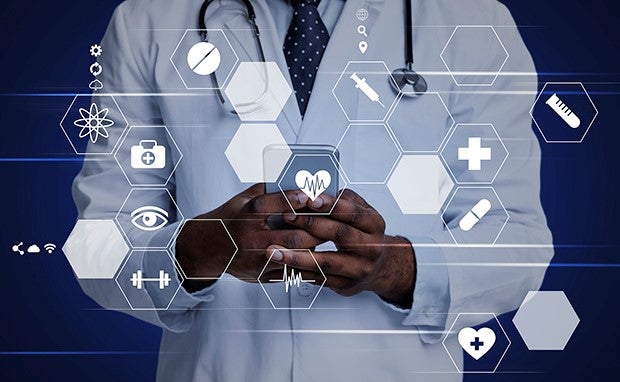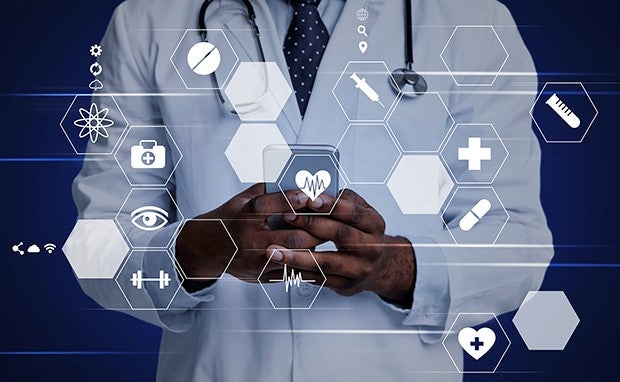

3 Innovative Ways Providers Are Tackling Great Challenges

Health care innovation comes in all shapes and sizes these days — from high-tech to high-touch. Some approaches bring incremental change while others transform hospitals and health systems and the lives of those they touch. And with myriad challenges facing the field, tackling complex problems takes precedence.
Here are a few innovative approaches being taken to address long-standing challenges in health care.
Taking It to the Streets with ‘Radical Humility’
Municipal and state governments have long been trying to address the homelessness crisis and the health care challenges this group faces, but none has faced a greater challenge than that of California. The state has an estimated 161,000 people experiencing homelessness on any given night, which accounts for more than half of all unsheltered people in the U.S., according to the state’s Department of Health Care Services report.
Street medicine, serving the homeless community by providing direct care on the streets, became a first line of defense during the pandemic in California and elsewhere. The University of Southern California (USC) Keck School of Medicine’s Street Medicine team cares for the unhoused wherever they live, whether it’s under a freeway or in a makeshift camp.
The team draws labs, takes electrocardiograms, cares for wounds and dispenses medications. With the Street Medicine team’s approach of “radical humility,” the patient takes the lead and makes the care decision. A USC report notes that the street medicine movement has been growing exponentially in recent years and is now active in more than 60 U.S. cities.
“Not only does street medicine offer care — often lifesaving care — but it also reduces costs for communities by addressing many health concerns before they intensify,” the report states.
The Centers for Medicare & Medicaid Services in late June created a place of service (POS) code [27] for the street following a multiyear effort by USC’s Street Medicine, the Street Medicine Institute and others to get the POS code to enable street medicine teams nationwide to be reimbursed for their services. The code goes into effect. Oct. 1.
Giving Discharge Patients the VIP Treatment
For patients nearing the end of their hospital stay and eager to return home, the discharge process sometimes can seem interminable. Recognizing this, a growing number of hospitals and health systems have created discharge lounges to improve the patient experience and throughput.
These spaces improve the patient experience by providing a calm and comfortable place to relax while awaiting the ride home.
Mass General Hospital’s MGH Capacity Coordination Center launched its discharge lounge as a pilot in 2020 amid the pandemic and now serves nearly 125 patients per month. The lounge allows patients to return home sooner when appropriate, which leads to less backup in the emergency department (ED) and reduces the time beds are occupied when the patient no longer needs inpatient care.
Montefiore Health System in New York City opened a discharge lounge that is reminiscent of an airport VIP lounge at its Moses campus in 2021. Located near the hospital’s front lobby, the lounge is staffed by certified nurse assistants (CNAs) who serve as discharge lounge coordinators. The coordinators pick up patients from their rooms and take them to the lounge, where they can watch TV and receive free snacks while waiting to be discharged.
In a recent update on its lounge, Montefiore Health said about one-third of adults leaving the Bronx hospital and ED are cared for in this setting. The day after discharge, the CNAs call to ensure that the former patients had returned home safely, that discharge instructions were clear and that they were feeling better.
The lounge sees as many as 43 patients per day with the average stay being 35 minutes and has saved more than 10,000 bed hours since it launched.
A ‘Smart Scale’ Aids in Monitoring Patients with Heart Failure
Heart failure affects about 6.2 million people a year in the U.S. and costs the nation more than $30 billion per year, according to the Centers for Disease Control and Prevention. Pennsylvania-based Geisinger, long known for its expertise in value-based care in treating patients with heart failure, is collaborating with a tech startup to develop and implement a fluid-guided care pathway for treating these patients.
With the buildup of fluid being a key indicator of worsening HF, the program’s goal is to operationalize a fluid-guided care pathway that provides an earlier warning of changes in status to improve care delivery and clinical outcomes using the Bodyport Cardiac Scale. An earlier study conducted in 100 Geisinger patients with HF showed the Bodyport Fluid Alert was able to detect HF events earlier, more accurately, and with fewer false alerts than weight-based monitoring alone, the current standard of care for HF patients. Geisinger’s goal with the program is to see if the Bodyport device can improve case managers’ efficiency in monitoring HF patients and prevent avoidable hospitalizations.
Similar in form to a conventional weight scale, the Bodyport Cardiac Scale is a physical platform with embedded sensors that noninvasively measure metrics of heart function and fluid status in the same step patients take to weigh themselves each day. The Bodyport Fluid Alert incorporates changes in weight, fluid levels and pulse rate measured through the Cardiac Scale to remotely notify care teams of changes in a patient's health status.
Geisinger’s case managers can log onto Bodyport’s data platform 24/7 to access a patient’s data. The platform also sends an alert whenever a patient’s fluid accumulation reaches a level that indicates worsening heart failure. Patients who are enrolled in the pilot will be sent the Bodyport scale, which is powered by four AA batteries. The device is cellular connected so patients do not need a smartphone or home Wi-Fi.



